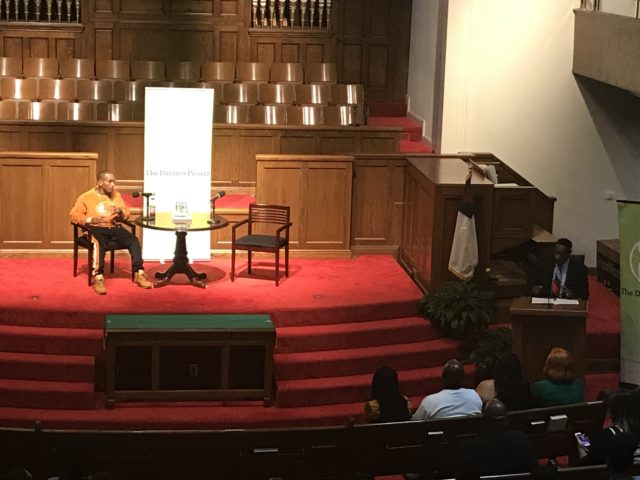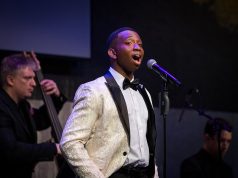
By Erica Wright
The Birmingham Times
“I wasn’t arrested, I was kidnapped,” Korey Wise told a packed audience last week at Historic Sixteenth Street Baptist Church on downtown Birmingham.
Known as part of the ‘Exonerated Five’, Wise kicked off his national Wise Up Tour where he will visit high schools, colleges and universities and speak to students about false imprisonment and unlawful incarceration.
Wise shared his truth with hundreds in Birmingham in his role as a national advocate for criminal justice reform as part of efforts by the city, Dannon Project and the Jefferson County Commission called the Social Justice Initiative.
Wise, 47, was 16 years-old when he was wrongfully convicted for the rape of the Central Park jogger in New York City in 1989. The case riveted media onlookers and divided New Yorkers for years. He spent over a decade in prison until the real perpetrator confessed to the crime and allowed Wise and the others — Antron McCray, Kevin Richardson, Yusef Salaam and Raymond Santana Jr., — to go free.
Wise who had been sentenced to five to 15 years was released after serving 14 after serial rapist Matias Reyes confessed to be to being the actual, lone perpetrator of the Central Park Jogger rape.
The Exonerated Five were the basis for the Netflix series, “When They See Us” by filmmaker Ava Duvernay, which shed a spotlight on what the five went through while on trial, during their incarcerations and life after.
“My journey started from April 21, 1989 and I had a brother with me by the name of Yusef Salaam who the cops were looking for,” he said in Birmingham. “Before the cops came, Yusef and I were just running around taking care of my errands, he was just hanging out with me.”
Wise said he and Salaam returned to the area where they live and the police were there. Wise recalls asking an older guy about the police presence in the area.
“He said the housing project is going through a police investigation. While we were there standing on the corner, the cops were coming through,” he said. “Four of them came running out of their cars” and went into the building where Wise and Salaam lived.
Wise said his apartment was on the 19th floor while Salaam’s was on the 21st. Wise said he and Salaam went upstairs to find out what the police wanted. Once they got upstairs, the police were at Salaam’s door.
“They asked him what’s his name and he said, ‘Yusef Salaam.’ When police began bringing in suspects in the 1989 Central Park Jogger case, Salaam, was brought in for questioning. In a show of support, Korey decided to accompany him. The police ended up pulling him into the interrogation room as well. “They could have said ‘go home’ but they didn’t want to do that so I went and that was it.”
That was the last time Wise was at home before he was released 14 years later.
After being taken to the police station and being detained and charged in the case, Wise said he spent most of his time back and forth to court. “The system had its way with me because nobody knew where I was at,” he said.
Wise spent the rest of his childhood and his beginnings into adulthood in the system.
Rikers Island
He was initially sent to Rikers Island, the infamous New York City jail and also spent several long periods of his incarceration locked away in solitary confinement.
“Everything is gone, I’m on Riker’s Island… one day I’m watching television, I was watching channel 7 and its breaking news and during that breaking news, it talks about Mr. Reyes and his history,” said Wise. “The idea came to my mind one time, ‘could he have had something to do with this’.”
While Wise was at Riker’s Island for about three years, he said he watched a program called Video Music Box to keep him connected with the outside world.
One day he was listening to the program in the day room while he was cleaning up just outside the room when someone had cut it off. That led to an altercation where he head butted another inmate, he said.
The correctional officers came in and broke up the fight, Wise said and it was then he found out the man he was fighting with was Reyes. Eventually, Wise was moved to a different correctional facility and so was Reyes. It was there that he received the news of his impending release.
“The CO (correctional officer) called out to me and he said ‘Wise . . . you got a caller’ and I’m like ‘huh’ and he told me I had to come to the chapel area . . . when I got down there they told me I had a phone call.”
On the phone was Wise’s mother.
“She’s hysterical saying ‘Korey, I love you’ . . . and she said ‘people just love you’ and I’m like okay, get to your point and she goes ‘whoever you found yourself talking to up there with you, he freed you. I felt like a monkey was lifted off of my back, I felt good hearing it. I’m like when can I go? Get me out of here!”
After that phone call, Wise said he got visits from his mother with different articles about Reyes confessing to the crime.
Once he got out, he learned he didn’t have to wear an ankle bracelet or register as a sex offender. He was told “we’re not going to put any stipulations on you because we do recall this guy Reyes speaking up for you but go home and we’re not going to put an ankle bracelet on you,” he said.
Free Man
Wise found himself a free man finally after serving 14 years in prison.
After sharing his story to his Birmingham audience, Wise answered questions and offered advice to others going through similar situations.
Given what he has been through, Wise said he would have liked to have more support from the community.
“Support the mothers to the best way you know how to, either call them, get with a parent, if you could travel to and from court,” he said. “That’s what I was saying from the beginning, I was wishing one of the older homies from my community could have stopped me but we all got to go through life and going through that is a form of understanding life, who is with you and who is not with you.”
Wise also said the criminal justice system is broken and may not be reformed. “You can’t reform something that is already broken. The only thing we can do about a system that is already broken is educate our babies on not going through it.”
Wise and the other four men received settlements totaling about $45 million from New York City and New York State. Four years ago, Wise donated $190,000 to the University of Colorado School of Law Innocence Project, which was renamed the Korey Wise Innocence Project.




